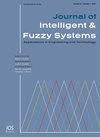Intelligent fuzzy edge computing for real-time decision making in IoT-based digital twin environments
IF 1
4区 计算机科学
Q3 COMPUTER SCIENCE, ARTIFICIAL INTELLIGENCE
引用次数: 0
Abstract
Intelligent Fuzzy Edge Computing (IFEC) has emerged as an innovative technology to enable real-time decision-making in Internet of Things (IoT)-based Digital Twin environments. Digital Twins provide virtual models of physical systems, facilitating predictive maintenance and optimization. However, implementing real-time decision-making in these environments is challenging due to massive data volumes and need for quick response times. IFEC addresses this by offering a flexible, scalable and efficient platform for real-time decision-making. This paper presents an overview of key aspects of IFEC including fuzzy logic, edge computing and Digital Twins. The use of fuzzy logic in IFEC provides an adaptive framework for handling uncertainties in data. Edge computing enables localized processing, reducing latency. The integration of Digital Twins allows system monitoring, analysis and optimization. Potential applications of IFEC are highlighted in domains such as manufacturing, healthcare, energy management and transportation. Recent advancements in IFEC are also discussed, covering new fuzzy inference systems, edge computing architectures, Digital Twin modeling techniques and security mechanisms. Overall, IFEC shows great promise in enabling real-time decision-making in complex IoT-based Digital Twin environments across various industries. Further research on IFEC will facilitate the ongoing digital transformation of industrial systems.基于物联网的数字孪生环境下实时决策的智能模糊边缘计算
智能模糊边缘计算(IFEC)已经成为一种创新技术,可以在基于物联网(IoT)的数字孪生环境中实现实时决策。数字孪生提供物理系统的虚拟模型,促进预测性维护和优化。然而,在这些环境中实现实时决策是具有挑战性的,因为数据量巨大,需要快速响应时间。IFEC通过提供一个灵活、可扩展和高效的实时决策平台来解决这一问题。本文概述了IFEC的关键方面,包括模糊逻辑、边缘计算和数字孪生。模糊逻辑在IFEC中的应用为处理数据中的不确定性提供了一个自适应框架。边缘计算支持本地化处理,减少延迟。数字孪生的集成允许系统监控,分析和优化。重点介绍了IFEC在制造业、医疗保健、能源管理和交通运输等领域的潜在应用。本文还讨论了IFEC的最新进展,包括新的模糊推理系统、边缘计算架构、数字孪生模型技术和安全机制。总体而言,IFEC在实现各行业复杂的基于物联网的数字孪生环境中的实时决策方面显示出巨大的前景。对IFEC的进一步研究将促进正在进行的工业系统数字化转型。
本文章由计算机程序翻译,如有差异,请以英文原文为准。
求助全文
约1分钟内获得全文
求助全文
来源期刊

Journal of Intelligent & Fuzzy Systems
工程技术-计算机:人工智能
CiteScore
3.40
自引率
10.00%
发文量
965
审稿时长
5.1 months
期刊介绍:
The purpose of the Journal of Intelligent & Fuzzy Systems: Applications in Engineering and Technology is to foster advancements of knowledge and help disseminate results concerning recent applications and case studies in the areas of fuzzy logic, intelligent systems, and web-based applications among working professionals and professionals in education and research, covering a broad cross-section of technical disciplines.
 求助内容:
求助内容: 应助结果提醒方式:
应助结果提醒方式:


